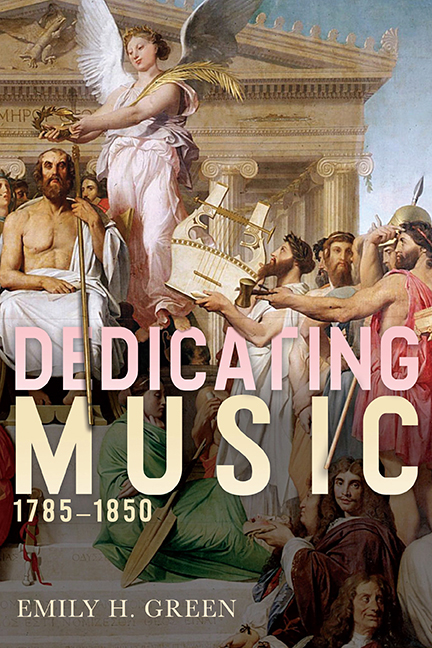Book contents
- Frontmatter
- Dedication
- Contents
- List of Illustrations
- Acknowledgments
- Introduction: Encountering Dedications
- Part One Maintaining Early Modern Models
- 1 Gifting a Commodity
- 2 Selling a Gift
- Part Two Commodifying the Composer
- Epilogue: Dedications and Romanticism
- Appendix: Dedicatory Epistles
- Notes
- Bibliography
- Index
1 - Gifting a Commodity
from Part One - Maintaining Early Modern Models
Published online by Cambridge University Press: 03 September 2019
- Frontmatter
- Dedication
- Contents
- List of Illustrations
- Acknowledgments
- Introduction: Encountering Dedications
- Part One Maintaining Early Modern Models
- 1 Gifting a Commodity
- 2 Selling a Gift
- Part Two Commodifying the Composer
- Epilogue: Dedications and Romanticism
- Appendix: Dedicatory Epistles
- Notes
- Bibliography
- Index
Summary
From all this we may learn, that a Great Man's Fortune is as easily known from a Dedication to him, as from the Rent-Roll of his Estate; and that his Bounty to the Author is only wages for publishing his Wealth to the World.
—Thomas Gordon, A Dedication to a Great Man, Concerning DedicationsSeveral pages before encountering Wagner's quasi-Marxist polemic on the sociopolitical function of musical spectacle, the reader of the first edition of Das Kunstwerk der Zukunft (publ. 1850) finds, as the very first text following the title page, a lengthy dedication to Ludwig Feuerbach. It begins: “To no one but you, my dear sir, can I dedicate this work, for with it I give you back your own property.” Following in the long tradition of dedicatory rhetoric (one that suits Wagner's grand prose style), the composer introduces his text not only as a gift to a prominent thinker but as a gift that caps a history of exchange with that individual: Wagner is not merely presenting an object or idea to Feuerbach; he is returning one. The implication is that some kernel of the text must first have been a present in the opposite direction, from Feuerbach to Wagner. Wagner's language further suggests that he relinquishes all claim to the work, that it is no longer his “property,” and that it is, crucially, not a commodity with monetary value but a gift whose meaning is constructed through exchange. This short dedicatory sentence, along with parts of the text itself, decries the commodity-status of art.
By emphasizing the role of reciprocation over that of contractual payment in the production of works, dedications reference a complex economy. While composers’ most basic kinds of exchange with traditional patron-dedicatees— such as remuneration, lodging, and gifts—have been studied, much of the meaning of dedications results from the abstract consequences of those offerings. Dedications between colleagues in particular involve more layers and have also received less attention in the literature; they are thus the focus in this chapter. When presented between music personalities, the reciprocation for dedications takes many forms: return dedications, teaching, performances, and reviews. Circumstantial evidence surrounding such tangible exchange suggests that composers and their publishers may have made many dedications in this period in the hopes that they would thereby gain an intangible advantage.
- Type
- Chapter
- Information
- Dedicating Music, 1785–1850 , pp. 41 - 76Publisher: Boydell & BrewerPrint publication year: 2019

